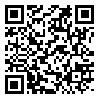Volume 6, Issue 4 (2025)
san 2025, 6(4): 69-87 |
Back to browse issues page
Download citation:
BibTeX | RIS | EndNote | Medlars | ProCite | Reference Manager | RefWorks
Send citation to:



BibTeX | RIS | EndNote | Medlars | ProCite | Reference Manager | RefWorks
Send citation to:
Rajabi F, Tajrobehkar M. The Representation of Social Agents in Shahad Al-Rawi’s The Baghdad Clock based on Van Leeuwen’s model. san 2025; 6 (4) :69-87
URL: http://san.khu.ac.ir/article-1-373-en.html
URL: http://san.khu.ac.ir/article-1-373-en.html
1- University of Guilan , Frajabi@guilan.ac.ir
2- University of Guilan
2- University of Guilan
Abstract: (478 Views)
Social agents play an important role in shaping a text or discourse. They are central to its meaning and purpose. However, little attention has been paid to how they are represented in literary texts. Van Leeuwen argues that agents are represented in two main ways: exclusion and inclusion. Each has its own subcategories. Understanding these representations helps to reveal underlying discourses in a text. This article studies The Baghdad Clock novel by the Iraqi author Shahad Al-Rawi as a research project to examine the representation of social agents in it. It will also identify and introduce the main functions of these social agents that passes through the underlying layer of the story. This research aims to understand different discourses in the novel. It also examines the socio-semantic functions that these agents signify through their representation. The results show that the author uses various methods of representation. However, the focus is more on inclusion than exclusion to describe the tragedies of Iraqi people. Among the inclusion strategies, partial identification is emphasized the most. It highlights movement and dynamism in the story, despite themes of war, destruction, and occupation. This research follows a descriptive-analytical approach.
Keywords: Arabic Narratology, The Baghdad Clock, Shahd Al-Rawi, Van Leeuwen, social agents, discourse, inclusion, elusion
Send email to the article author
| Rights and permissions | |
 |
This work is licensed under a Creative Commons Attribution-NonCommercial 4.0 International License. |






